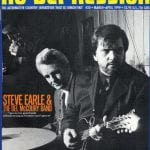Bubbadinos – More than what Bubba D knows
Welcome to Mutant Country, the down-home alien world of the Bubbadinos.
If you look at the song titles on the Bubbadinos’ first CD, Ready As We’ll Ever Be (Zerx Records), most of the cuts are readily identifiable: “Lost Highway”, “Tennessee Waltz”, “Amazing Grace”, “Battle Hymn Of The Republic”, “Pancho & Lefty”. But I guarantee you’ve never heard these tunes sound like this. As an advertisement for their first public performance at Albuquerque’s Outpost Performance Space read: “The Bubbadinos done tarred of playing all the regular notes.”
In one published 1997 interview, chief Bubba Mark Weber talked about the band he was forming. “I’ve managed to talk these jazz musicians (and one Cajun) into playing them old country songs me and my granddad used to do,” Weber said. “This is not so different than what Jimmie Rodgers was doing in the late ’20s.”
Maybe so — but I don’t think Jimmie done it this way.
Weber, a writer and poet by trade, and his cohorts created a surreal country sound that would repulse purists among the country and folk set as well as the jazzbos. With a lap steel sounding like an assault weapon, a grunting tuba, and a fiddle trying to make sense of everything while a singer growled and mumbled the lyrics of country classics or venerated spirituals over the din, it’s easy to see why.
“The jazz crowd, from whence most of us come, don’t want to have anything to do with country music,” Weber says. “The country crowd would string us up if they could find us; and the folkie people have turned so rigid and conservative and narrow-minded, they shiver at the thought of us.”
While purists of any stripe might be horrified by the avant-hillbilly sounds of the Bubbadinos, fans of the Residents or Captain Beefheart or Thinking Fellers Union Local 282 or even Giant Sand probably would understand.
The origin of the Bubbadinos began back in Weber’s native Los Angeles in 1995, when he and several collaborators created a music and spoken word collage. Weber told stories about making music with his grandfather between snatches of songs performed with a band (which included pre-Geraldine Fibbers Nels Cline) at the Alligator in Santa Monica.
Back in Albuquerque, he decided to record the verses of songs he’d left out of the performance piece. For this he rounded up Bubba D, aka J.A. Dino Deane (lap steel and bass flute), Mark Weaver (tuba), Ken Keppeler (fiddle, accordion, mandolin, harmonica, jawharp) and Stefan Dill (flamenco guitar and hubcap), who previously worked with jazz great Cecil Taylor.
Bubba D is a jazz trombonist who says he used to hide his albums by The Band from his jazz cohorts. Weber originally approached him to play his horn with the Bubbadinos, but “I said the only way I’d be in this band was if I could play lap steel. He said he didn’t know I played lap steel and I said, ‘I don’t.’ But that didn’t bother him. I still like to maintain a primitive relationship with that instrument.”
Keppeler is the only Bubbadino with a country or folk music background, having played for nearly 20 years or so in a Cajun-centric band called Bayou Seco with his wife, Jeannie McLerie. Former residents of Louisiana, the couple has worked with the likes of the Balfa Brothers and Beausoleil.
According to Bubba D, after hearing the playback of “Wade In The Water”, the first song the Bubbadinos recorded, “Everyone grew real quiet. Finally Ken said, ‘Well, there goes my credibility as a folk musician.'”
Credibility or not, Keppeler remains a Bubbadino, joining the group in recording their second, soon-to-be-released CD, We’re Really Making Music Now. This will contain covers such as “I’m An Old Cowhand”, Johnny Paycheck’s “11 Months And 29 Days”, Jimmie Rodgers’ “My Blue Eyed Jane” and the Japanese pop hit “Sukiyaki”, as well as a dozen or so Weber originals.
For the time being, the Bubbadinos are a studio phenomenon, with only two live performances under their belts. Geography is a problem, as the band members live all over the state. But Weber intends for the band to continue; as he puts it, “We’re still not quite where I want it to be.”




